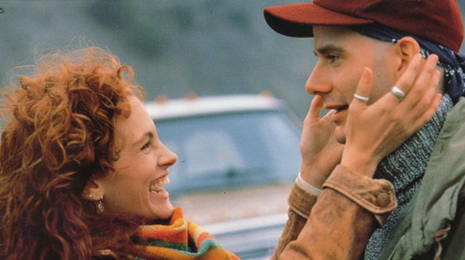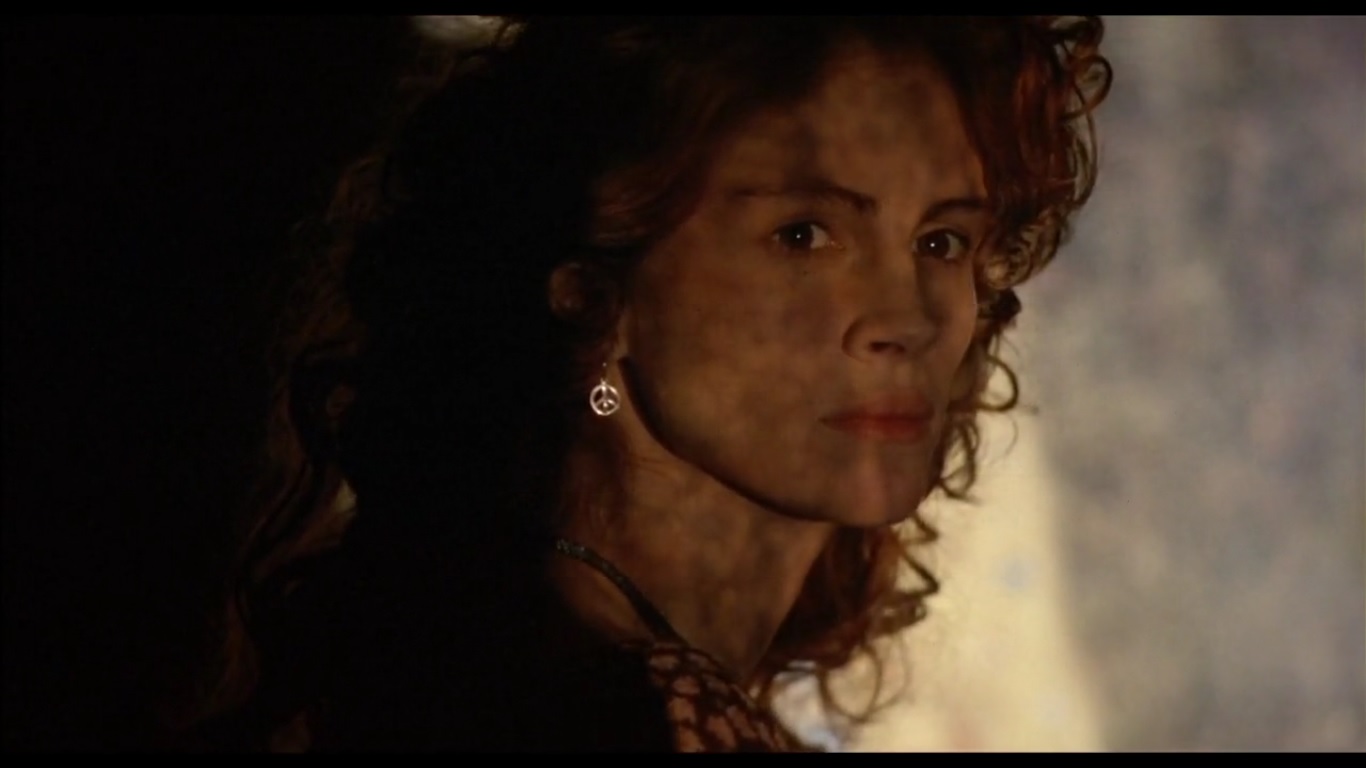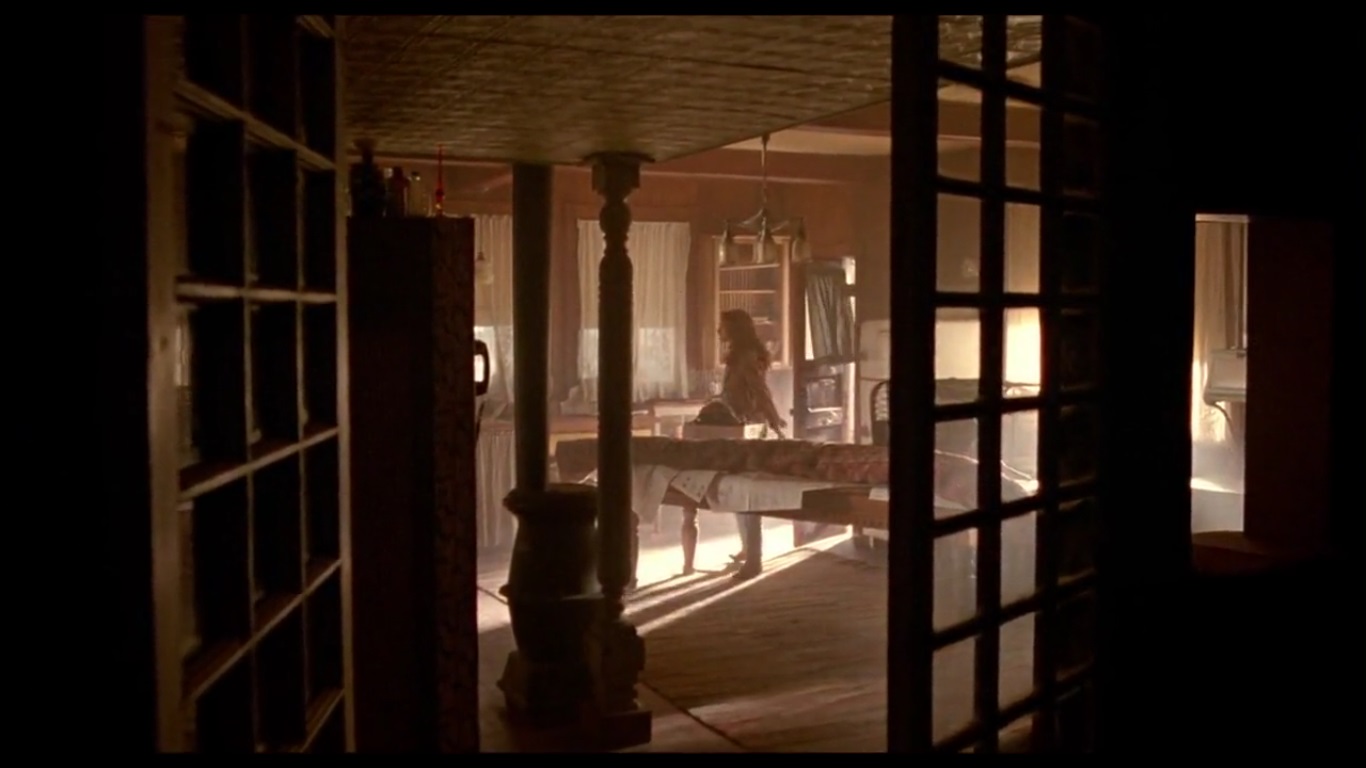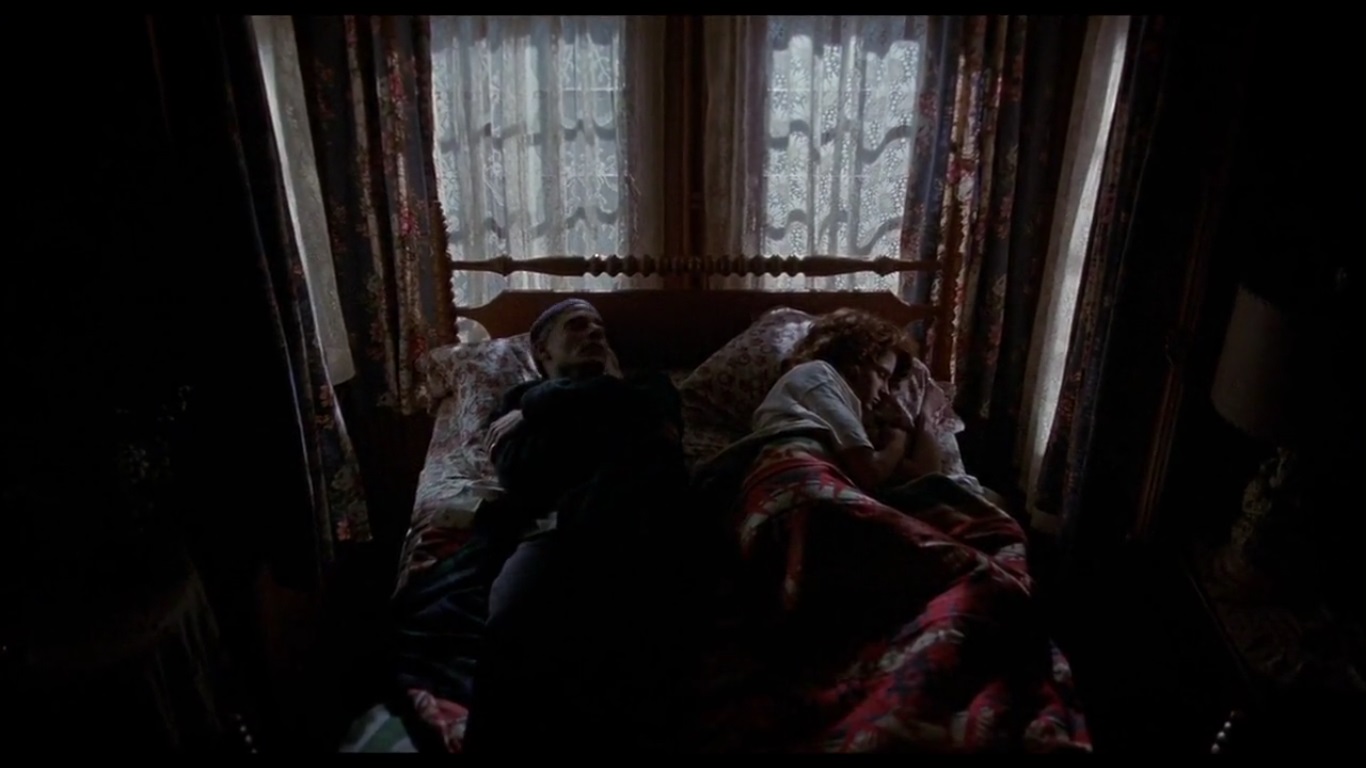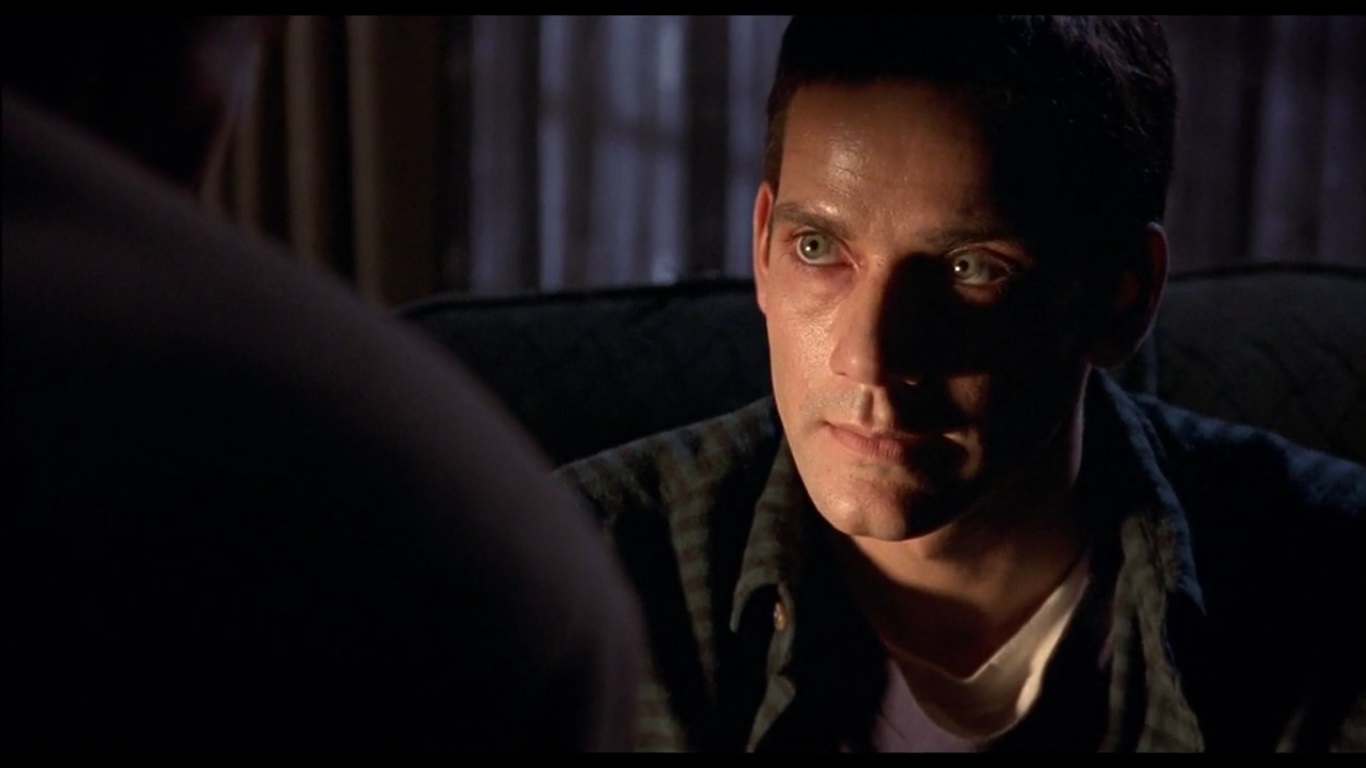Dying Young (1991)
written by: Marti Leimbach and Richard Friedenberg
starring: Julia Roberts, Campbell Scott, Vincent D'Onofrio
I'm a sap. I'm a big ol' sap, and that's true, and I admit that. I like romance and drama and great swells of emotion coupled with great swells of music. I like having a good cry. By extension, I like movies with drama and soaring feeling and people being in love and running to each other and clutching each other while they cry and I cry and we all cry together. I like that sappy stuff, because I am a sap.
All this is probably why 1991's Dying Young worked for me.
Because, to be fair, it's pretty cheesy. Going into it, I was ready to be skeptical and ready to find it hokey and schmaltzy and dumb. I figured it was a Weepie, and knowing that it was a Cancer Weepie on top of that, I went in sortof figuring I knew how it would go down. It seemed obvious, and I was ready to be unaffected by it. The little summary on IMDB seemed clear-- Woman becomes nurse for Man with Cancer. Woman and Man fall in love. Love is doomed because Man is doomed, because of, you know, that Cancer Thing.
I had not read anything about how the ending was changed after early test screenings, or how Schumacher felt he was the wrong person for this kind of movie, or anything about it, really. My preconceived notions existed solely off the fact that I knew it was a romance, and a romance where one of the pair had cancer. That seemed like enough, and I was pretty sure I knew what I was walking into and how it would all turn out. It sounded like pure tragedy in the making. And yet! More than once, the movie surprised me. More than that, it charmed me. It made me feel things.
A lot of the success of the film comes from it's two leads-- Julia Roberts, who has this ability to make anything seem genuine, even schlock and schmaltz, and Campbell Scott, who has haunting eyes and a hidden kind of charm that certainly snuck up on me. Julia's the real star here, though, and she really has something remarkable about her. She's effervescent always, grounded and charming and wry and genuine. And beautiful, of course, stop-in-the-street-and-look beautiful. With a bat of her eyelashes and a twist of her mouth, she can make you believe almost anything. I suppose it comes down to that folksy, blue-collar charm that makes everything feel personal, and intimate, and real. That's a special gift. Meanwhile Scott, who doesn't have quite the same innate appeal or grounded warmth at all times, can still totally deliver on tender looks and can make a monologue sound nearly natural-- and together the pair of them carry a movie that could veer too far into High Drama at any moment, if someone wasn't holding it down.
The film begins with a shot of a piece of graffiti of the angel of death. Literally that's the first shot in the movie. It's so not-subtle I could barely stand it, but Schumacher loves his graffiti, so I'll allow it, and things calm down from there. We meet Julia Roberts as Hilary O'Neil, girl of Oakland, and in classic Schumacher style there's careful attention paid to the scenery, the extras, the bustling, colorful life of her home and her existence. She's young and lively, with her big red hair catching the glowing light ever so beautifully and her teeth sparkling when she laughs. She catches her boyfriend cheating (convenient), and rightly storms out-- leaving her unemployed and living with her mother (Ellen Burstyn), who infuriates her.
It's in this way that she answers a classified ad asking for a nurse, "Young Attractive Female Only". So in her bright red suit, with her bright red hair, she trots up to the fancy part of town (taking off her heels to climb the stairs, such a charming small detail), and tries to make a good impression on a household of stodgy old people who seem to be as good as covered in dust. The man in need of nursing is Victor Geddes (Campbell Scott, of course), who is young, frail, a little awkward, and about to start chemotherapy treatment for his leukemia. His father insists on a more experienced nurse, but Victor insists on Hilary, attracted to her short skirt and short temper.
Their first meeting is quiet-- no music, only muted dialogue in increasingly tight close ups. Victor asks her about her nursing experience, her interests. She's tetchy and defensive. Scott puts on this stilted way of speaking (my previous experience with him, particularly in Singles, makes me think this is a purposeful affectation, and it works, embodying Victor's controlled and sheltered lifestyle), and this early conversation is so stiff and tense. Hilary is buoyant and tough, Victor is tightly-wound and fragile, but proud. He's a little weird and his jokes never land. He's isolated in every way, but he's straight forward and gentle, and there are glimmers of real charm and likability in him. His apartment is stark and white-- the energy that Hilary carries with her is clearly a shock to the stagnant ecosystem. What becomes clear is that Victor wants, and desperately needs, something (someone) to inject life into his life. Hilary is so full of life, and he sees in her a chance to be a person, not just a sick person, which is how his father sees him.
So Hilary moves in, and her presence immediately begins to add color to the apartment and vitality to Victor's life.
The movie handles Victor's illness pretty well, I think. It doesn't shy away from the ugly parts of it, and how the cure is also a poison. There's very little romanticism of illness or of him. The first time Hilary accompanies Victor to the hospital for his treatment, she looks around at the other patients-- as viewed through Schumacher's sympathetic eye and the rosy glow that coats most of Dying Young, you get the sense that Hilary is creating a romantic fantasy-- the quiet bravery of the sick, the nobility of the fictional tuberculitic. This scene is immediately juxtaposed with Victor crashing through the door of his apartment, careening down the hallway and collapsing into the bathroom to vomit. It's not brave, or noble, or romantic. It's horrible and painful. Hilary struggles to help him, and finds herself deeply overwhelmed by it all. Victor is angry and petulant and he's resistant to help and cannot be comforted. Schumacher films this sequence in long runs from the kitchen to the bathroom to the bedroom, handheld and frantic, following Hilary as she tries to be helpful and control her mounting panic.
After the first treatment, the pair fall into a life together. There are stilted attempts to relate to each other-- Hilary reads books on homeopathic wellness and healthy eating. They both quit smoking. Victor tells her about the PhD dissertation he's working on. It's art history focusing on Klimt and his red-headed women. Another not-subtle thing. But the through line of Klimt paintings actually worked for me, in the end. It's a little heavy for a while, maybe particularly for me since I'm pretty familiar with the artists work, and with the other artists Victor brings into the art conversation, especially Rossetti. There were a lot of artists enchanted by striking red-headed women, and it's easy to fit Julia Roberts into that esteemed and well loved group. It's a sappy thread, but, eh, why not? Artists love their muses, and Schumacher is no exception. He films Roberts gorgeously, creating smooth canvases from her shoulders and the curve of her cheek.
As things progress, for a while I thought the movie might be "Fun Woman enters life of Man and Manic Pixie Dream Girls him into enjoying life before it's over," but that's not what happens. Just as I thought, "oh, that's what we're doing?" the movie turned left on me and didn't do that. A pleasant surprise. Hilary takes Victor to a club with her friends, sees he's not enjoying it, and they leave. They're each pretty uncomfortable in the others sphere, but they are comfortable together. It's nice to see them recognize that they need to carve a third, different space between them.
And Victor starts to get better. His energy is up, he smiles more. He tells Hilary his chemo treatment is done, and he wants to take a vacation up the coast. "A safe vacation," he assures her. Moving into the second act of the movie, it turned from something I liked well enough to something I really, really liked. Hilary is hesitant to go anywhere that isn't close to the hospital, and Victor assures her that he's fine, he's going to recover. It's so earnest and so heartfelt, as in the best scenes in Schumacher movies. Victor wants them to go live in a way that's new, for both of them, and off they go.
So they go up the coast and rent a house. Hilary teaches him to drive! His hair starts to grow back! He's so cute and away from the trappings of his stiff upper-class life, he warms up into an absolutely charming young man. Their fresh start in the country is so lovely and so affectionate. They make friends in town, they clean up their little house. Everything is rosy and cozy. The house is consistently shot in these almost hazy ways, with glowing streaks of dust in the sunlight. They totally open themselves to the possibility of the future, and in doing so, open themselves to love. I think the love story isn't necessarily what works best for me in this one-- the Falling In Love part of it, anyway. But the Being in Love part is soo nice. The best scenes in this movie exist in the small, intimate moments of their being in love. The little moments of how they sit together, the way they cook together, how she changes in front of him. It's gentle and playful and natural, and I found myself totally entranced by the two of them. They're very sweet, and I was so pleasantly surprised by how much I found myself liking them and wanting them to be happy.
I was also pleasantly surprised by how things shake down with Gordon (Vincent D'Onofrio), who shows up in the back half of the movie as a friend Victor and Hilary make in town. Gordon and Hilary have a lot in common-- they banter easily, they have the same taste and reference points. They like the same sitcoms. He's clearly attracted to Hilary, and she's very friendly with him. There's a scene where Hilary, Victor and Gordon watch Jeopardy together, and Hilary and Gordon know all the pop culture references and Victor knows all the history and science. There's a clear difference in who these lovers are, but the scene never turns to ugly jealousy. It becomes playful instead, as the three of them get caught up in the excitement of getting right answers. It's comfortable and jokey, and they're all having fun together. I loved that there was never real risk of jealousy or infidelity. There was a moment of tension where I thought that might happen, but then, the tension dissolved. Hilary loves Victor, and likes Gordon as a friend, and that's that.
And then comes the third act, where you realize that Victor is not well, not recovering. He's relapsing, and he's hiding it. The movie, by this point, had tricked me into thinking he would be okay, and when I realized he was getting sick again, I was... very upset. Which is fair, because Victor is very upset too. It's effective. He'd convinced himself that everything was going to be fine, as if being in love with Hilary and having this life with her could really cure him. It's painful to watch him crumble into self-sabotage, culminating in a scene where he has a breakdown at dinner, getting drunk and yelling and railing. The scene is shot in these messy handhelds, a long take of swirling motion and uncontrolled feeling. It's very good-- maybe Schumacher was hesitant to take on this kind of film, but he handles it well and with confident, appropriate moves. The raggedness of that scene then comes to a very tight confrontation, with hard close-ups that get tighter and tighter. The scene pinholes in with a crushing intensity and focus. Hilary, furious that Victor not only lied to her but has resigned himself to death by walking away from his treatments and refusing to go back, storms out. She won't watch him die. Tensions mount, emotions are running high, and I'm sitting on my sofa clutching my pearls in agony. Then Victor explains to his father that he left treatments because he wanted a life, a real life, not a half life of hospitals and nausea. No more treatments. He wanted his hair to grow in. He wanted Hilary to see him with hair. Campbell Scott delivers that line so beautifully, I burst into tears. It's so small, so delicate, so sad. Schumacher, in his perfect patience, has played the scene between Victor and his father in stark, moody lighting and simple frames. Scott looks haunting, striking, tragic. It's such a lovely scene, without anything too big or showy. It's marvelously modulated, exactly right.
Then, in the greatest of pleasant surprises, this movie has a goddamn happy ending. Hilary rushes out of a party wearing a gauzy white dress, finds Victor, and convinces him to go back to treatment, to choose more life. Whatever of his life is left, if it's a year or fifty years, they'll share it together. It's cheesy, yeah, but it's nice. So rarely do stories about illness end with this kind of upnote. They leave the house, heading off to face whatever hardships come next, together.
It's schmaltzy, but I'm very susceptible to schmaltz.
This movie isn't the peak of what Schumacher can do, and certainly it's not what he's best at, but it's a strong picture nevertheless. It doesn't reach the stylistic heights of the more genre-driven pictures, or even the tender, simple romance of Cousins, but it is perfectly successful. It's not necessarily a breathtaking movie, overall, but the narrative surprises are clean and refreshing, and the performances are uniformly strong. It has it's moments of visual interest and style. Schumacher walks a fine line between sentiment and sappiness, and I think walks it well. As a sap myself, I thought it was just right. Perhaps despite his own misgivings about it, he made a sweet, warm little movie that was less weepy than I expected and had it's moments of gorgeous, genuine style and art. You can see the filmmaker he is, even in this not very remarkable movie. Not even a cancer drama can keep a good stylist down.
Overall: ★ ★ ★
Schumacherness: ★ ★
Up next: Falling Down (1993)

